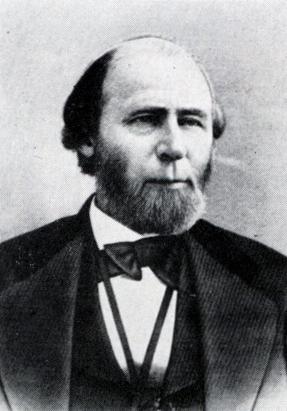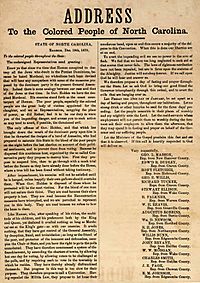William Woods Holden facts for kids
Quick facts for kids
William Holden
|
|
|---|---|
 |
|
| 38th and 40th Governor of North Carolina | |
| In office July 1, 1868 – March 22, 1871 |
|
| Lieutenant | Tod Caldwell |
| Preceded by | Jonathan Worth |
| Succeeded by | Tod Caldwell |
| In office May 29, 1865 – December 15, 1865 |
|
| Appointed by | Andrew Johnson |
| Preceded by | Zebulon Vance |
| Succeeded by | Jonathan Worth |
| Member of the North Carolina Senate | |
| In office 1846–1848 |
|
| Personal details | |
| Born |
William Woods Holden
November 24, 1818 Orange County, North Carolina, U.S. |
| Died | March 1, 1892 (aged 73) Raleigh, North Carolina, U.S. |
| Political party | Whig (Before 1843) Democratic (1843–1865) National Union (1865–1866) Republican (1866–1892) |
William Woods Holden (born November 24, 1818 – died March 1, 1892) was an American politician. He served as the 38th and 40th Governor of North Carolina. He was first chosen by President Andrew Johnson in 1865 for a short time. Later, he was elected by the people in 1868. He was a leader of the state's Republican Party during the Reconstruction Era.
Holden was the second governor in American history to be impeached. He was the first to be removed from office through this process. His removal was mainly because he tried to stop the Ku Klux Klan. After Republicans lost an election in 1870, other politicians removed him. This was due to his actions during a time called the Kirk–Holden war. He is the only North Carolina governor to have been removed from office this way. In 2011, Holden was officially pardoned after his death by the North Carolina Senate.
Contents
William Holden's Life Story
Growing Up and Early Career
William Holden was born on November 24, 1818. He grew up near Hillsborough, North Carolina. When he was 10, he started working at the Hillsborough Recorder newspaper. He learned about printing and writing for six years.
By age 19, Holden worked as a printer and writer in Raleigh, North Carolina. He then studied law and became a lawyer in 1841. He joined the Whig party. However, he chose to work in newspapers instead of practicing law.
In 1843, he became the owner and editor of the North Carolina Standard newspaper in Raleigh. He changed the newspaper's political group to the Democratic Party. When Holden took over, the newspaper was having money problems. Under his leadership, it became one of the most popular newspapers in North Carolina. He continued to run the newspaper until he became governor.
Holden's Political Journey
In December 1843, Holden became a delegate for the Democratic party. He was chosen for the North Carolina Democratic Party state committee. In 1846, Holden was elected to represent Wake County in the North Carolina House of Commons. He served only one term.
During the 1850 elections, he helped end the Whig party's power in the state. By 1858, he was the leader of the Democratic party. That year, he tried to become the Democratic candidate for governor but lost.
In the 1840s and 1850s, Holden supported the right to expand slavery. He sometimes supported states leaving the Union. But by 1860, he changed his mind and supported staying in the Union. Holden and his newspaper became unpopular with the state Democratic Party. He lost his job as the state's printer when he wrote against states leaving the Union in 1860. In 1861, Holden was sent to a state meeting to vote against leaving the Union.
As the Civil War continued, Holden began to criticize the Confederate government. He became a leader of the North Carolina peace movement. In 1864, he ran for governor against Zebulon B. Vance. Holden wanted peace, but Vance won by a large amount of votes.
When the Civil War ended in May 1865, President Andrew Johnson chose Holden to be governor. This was during the Reconstruction period. Holden put his son, Joseph W. Holden, in charge of the Standard newspaper. However, Holden lost a special election for governor in 1865 to Jonathan Worth.
President Johnson then suggested Holden become a diplomat to El Salvador. But the Senate did not agree. So, Holden went back to editing the Standard. He also became president of the North Carolina Union League. He helped start the North Carolina Republican Party in 1866–67.
Becoming Governor of North Carolina

In 1868, Holden was elected governor as a Republican. He won against Thomas Samuel Ashe. When he became governor, Holden stopped being the editor and owner of the Standard newspaper.
To fight the Ku Klux Klan, Holden hired detectives from 1869 to 1870. Even though the detectives did not completely stop the Klan, Holden tried harder than other Southern governors. The state legislature gave him new powers in 1870 under the Shoffner Act. He used the state military against the Klan that year. He declared special rules in two counties. He also stopped the normal legal rights for accused Klan leaders. This time was known as the Kirk–Holden war.
This led to a strong reaction from other politicians. There was also violence during the election to stop Black people from voting. The Republicans lost the election for the legislature.
After the Democratic Party gained control of the state legislature in 1870, Governor Holden was impeached. This happened on December 14, 1870. During his trial, he was defended by Nathaniel Boyden and William Nathan Harrell Smith. However, he was found responsible for six of the eight charges against him. This was decided by Democratic members of the North Carolina Senate on March 22, 1871. Holden's son-in-law, state senator Lewis P. Olds, voted against removing him.
The main reasons for the charges against Holden were about how state military officer Colonel George W. Kirk treated people. This happened when enforcing new laws during Reconstruction. Holden had formed the state military to respond to serious events. These included the killing of Republican senator John W. Stephens in May 1870. Also, Wyatt Outlaw, a Black police officer, was killed in Graham. There were also many attacks by the Ku Klux Klan.
Holden was the first governor in American history to be removed from office after being impeached. Governor Charles L. Robinson of Kansas was the first American governor to be impeached, but he was not removed.
Later Years and Legacy
After being removed from office, Holden moved to Washington, D.C.. He continued working on the Daily Chronicle newspaper. In 1873, President Ulysses Grant appointed him as the postmaster for Raleigh. He held this job until 1881. Later, Raleigh Republicans asked President James A. Garfield not to re-appoint him. Holden left the Republican party after losing his position.
Holden died on March 1, 1892. He was buried at Historic Oakwood Cemetery in Raleigh. Walter Hines Page, a North Carolinian, said Holden was "one of the foremost men in intellectual power and daring that were ever born here." In 2011, Holden was officially pardoned by the North Carolina Senate with a vote of 48 to 0.
Images for kids
See also
 In Spanish: William Woods Holden para niños
In Spanish: William Woods Holden para niños
 | Selma Burke |
 | Pauline Powell Burns |
 | Frederick J. Brown |
 | Robert Blackburn |



